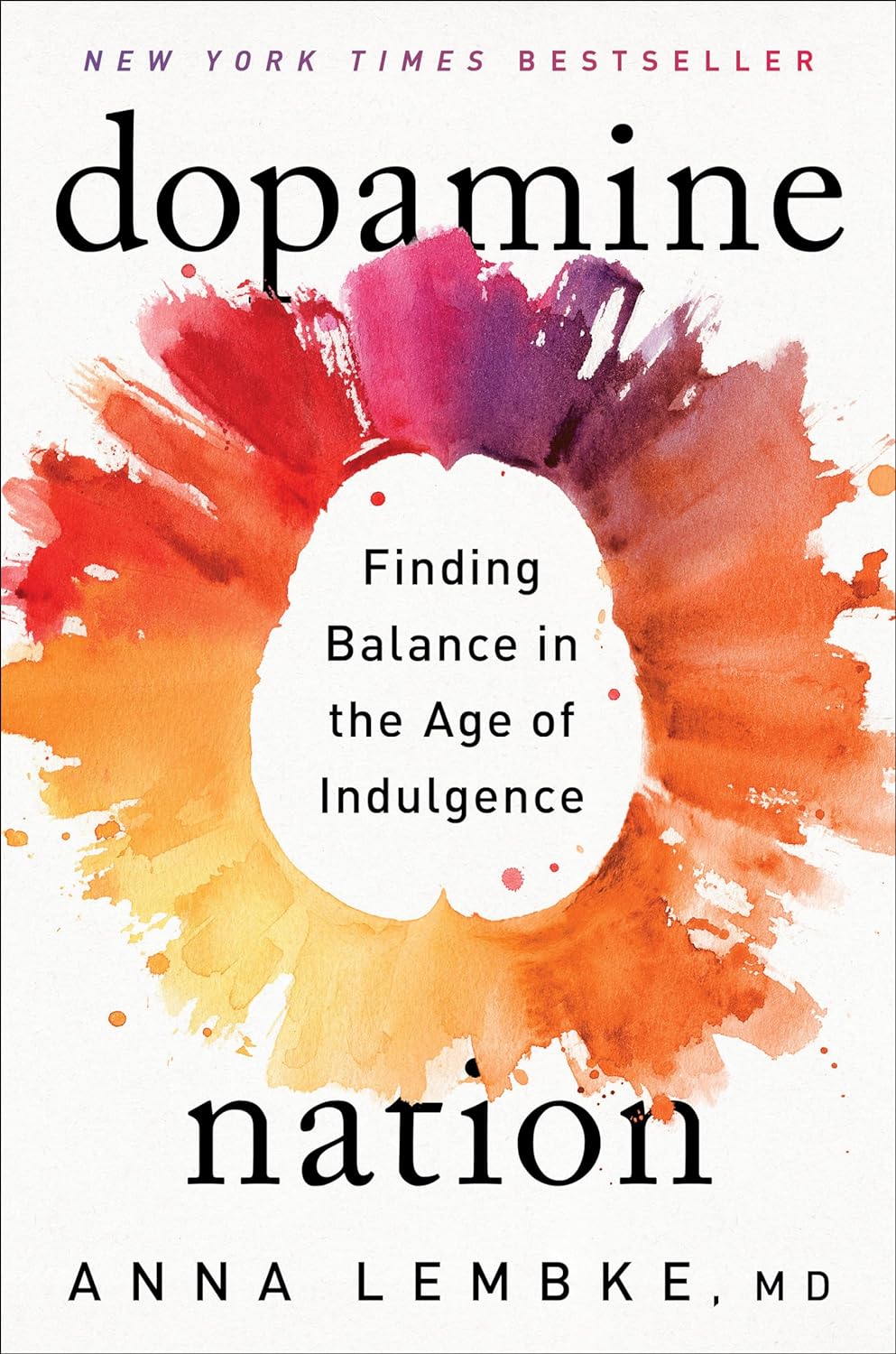
Book Review and Summary of Dopamine Nation: Finding Balance in the Age of Indulgence
Dopamine Nation helps us find balance in a world that encourages us to over-indulge. Dopamine, sometimes referred to as “the feel good hormone”, is essential to our brain function. It helps us feel pleasure as part of our brain’s reward system, helping motivate us to find food and much more.
The problem is, compared with our ancestors, we are living in a world that provides almost constant options to pursue pleasure and rewards. As my brother Bill put it, we used to hunt food; in much of today’s society, food hunts us! In addition, we can get “hits of dopamine” from sex, shopping, video games, drugs, alcohol, gambling, and many other sources. Such vices are often pushed on us through advertising and techniques that take advantage of human psychology to get us to buy and consume. It’s all too easy to get unbalanced, compulsive, and even addicted to dopamine-boosting activities.
Dopamine addiction is a serious problem
Dopamine addiction can be problematic in many ways. One of the most important may be that our quest for dopamine results in less pro-social activities that can give us other, possibly more helpful neurotransmitters, such as oxytocin–which helps us bond with other people. The science is clear: quality relationships are the most important factor in happiness and well-being for most of us, most of the time. If we’re constantly chasing dopamine through video games or gambling, for example, we’re not investing time and energy in human relationships, which ultimately may benefit us the most. Society’s addiction to dopamine may be a key factor in some of society’s major modern problems, including but not limited to loneliness and social isolation.
(St. Charles Health System here in beautiful Central Oregon is partnering with Happy Brain Science by funding and collaborating with us in the development of a new workshop titled Building Belonging: The Science of Connection in a Lonely World. In that workshop, we explore this idea in depth, and what we can do about it. If you’re interested in that workshop, please contact us.)
Dr. Anna Lembke has written a clear and compelling guide to finding balance again. She knows her science. Dr. Lembke is Chief of the Addiction Medicine Dual Diagnosis Clinic at Stanford University. She also experienced her own addiction to romance novels. She brings her professional and personal experience to deliver a book that can be helpful to many of us who might be getting out of balance. (I am not a doctor or a psychologist, so please keep that in mind as I review this book. If you need help overcoming addiction, professionals can help in a way that Happy Brain Science can not!)
We are getting addicted to comfort and dopamine
It’s perfectly natural for us to want to avoid pain and pursue pleasure. But modern society’s many invitations to get more dopamine result in us constantly avoiding any discomfort by quickly masking any unpleasant feelings with more pleasure and dopamine.
Dr. Lembke challenges us to learn to tolerate discomfort and deal with our emotions. Discomfort can be a catalyst for growth. We can learn to be stronger, more independent, and more emotionally intelligent by learning to navigate unpleasant emotions in life.
Our brains adapt, so we need more, more, more
Our brains adapt quickly to a variety of situations and stimuli. If we regularly get more and more dopamine in our brain, dopamine’s effect is reduced, so we need more of it to achieve the same feeling. This neuroadaptation drives an endless quest for more dopamine, resulting in addiction. This is related to the “hedonic treadmill”, discussed in Eudiaimonia: What Is It, and Why is It Better than Hedonism. If we don’t get enough dopamine, we can get cravings that result in bad moods, anxiety, and worse.
Give yourself fewer invitations to your addictions
Our brains can have trouble staying in balance given the way neurotransmitters work, and modern society gives us endless opportunities to indulge in our addictions. One way to get your brain back into balance is to reduce temptations. If sugar is a key source of pleasure and dopamine for you, you might choose to never put yourself in a bakery or the candy aisle at the supermarket. While this can help us, society finds ways to tempt us with advertisements, birthday cakes, and dessert buffets at events. So while reducing temptations is helpful, it likely won’t be a complete solution.
Better ways to get dopamine: helping others and pain!
A central idea in Dopamine Nation is that discomfort and even pain can help our bodies produce more dopamine naturally. Exercise–already shown to boost mood, health, memory, and more–is a key way to produce dopamine naturally. If that exercise gets uncomfortable, even better! Because when our bodies get uncomfortable, our brians produce dopamine, endorphins, and other neurotransmitters to help us feel better. Dr. Lembke suggests immersing yourself in cold water (safely, of course), or anything else that might make you experience a bit of discomfort or even (mild, safe) pain, so your brain produces dopamine without addiction-feeding behaviors that can get us out of balance.
Which neurotransmitters are you pursuing in your life, and how? How is that working for you? Could you be making better choices? Based on the science, we highly recommend choosing exercise and social connection over most other dopamine-driving choices. Please tell us what questions and comments you have.